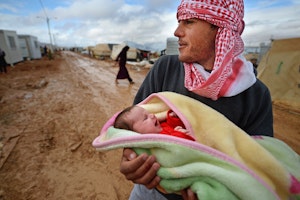Time to Speak Out Against Statelessness in Europe
By Chris Nash

Luka has lived in Slovakia for over 20 years. His partner is a Slovak national, as is their eight-year old son. But officially, Luka is not the child’s father: on the boy’s birth certificate, the line for “father” is left blank.
This is what it’s like to be stateless. Luka’s existence is not recognized by the Slovakian state (although he has been fined multiple times for his “illegal stay” and was once held for 14 months in a detention center). He cannot work legally or get health insurance.
The accounts of stateless people from across Europe are similar to Luka’s. Isa, stateless in Serbia, cannot get married, work legally, or travel outside the country. “To be without documents and a nationality is as if you never existed in this world,” he says. Similarly, Sarah, who is stuck in legal limbo in the Netherlands, explains: “I live day by day, not knowing what the future will bring.” Having fled fighting in the Democratic Republic of Congo as a child, she is now stateless. Because the Netherlands currently has no procedure to recognize or regularize stateless persons, Sarah has no solution in sight.
The stories of Luka, Isa, Sarah, and others have been gathered by the European Network on Statelessness (ENS) as part of its campaign to protect stateless persons in Europe. Launched last year, the campaign will culminate with a coordinated day of action on October 14 urging European governments to take steps to solve the statelessness crisis in their midst. A recently launched online petition, available in nine languages, calls on Europe’s leaders to take action. The petition, like the first-person accounts ENS has gathered, is intended to give stateless persons a voice and to remove at least a little of their invisibility. Click here to add your name to the petition.
Although the causes of statelessness in Europe are manifold and complex, there are relatively simple practical reforms that would provide a much-needed solution. One starting point would be for European countries that have not signed the 1954 Statelessness Convention (including Cyprus, Estonia, Malta, and Poland) to do so. And countries that have signed the convention must live up to their obligations under it. For example, Slovakian legislation actually provides a way to regularize the status of stateless persons so they do not need to suffer the way Luka has. But unfortunately Slovakia’s legislation fails to articulate a procedure to reliably identify stateless persons. In other words, the problem is one of implementation. To help countries better implement anti-statelessness measures, ENS recently published a good practice guide on statelessness determination, intended as a tool for states looking to introduce these essential procedures.
Obviously the stories of Isa, Sarah, Luka, and others are just a glimpse of the human impact of statelessness, but they echo more detailed research undertaken recently, including UNHCR mapping studies in Belgium and the Netherlands. This research confirms that the lack of a process by which stateless persons can regularize their status leaves them at risk of a range of human rights abuses. Many stateless persons find themselves destitute, forced to sleep on the streets, and can be vulnerable to human trafficking. Others are subjected to long term immigration detention. Few are in a position to break this cycle, and as a consequence are left in legal limbo for years.
Chris Nash is a member of the steering committee of the European Statelessness Campaign.
